Chris Baty's Blog, page 63
January 31, 2020
Join the 10th Annual Pitchapalooza!
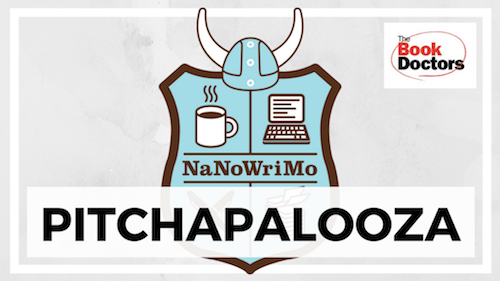
Ready to pitch your novel to the pros? Here’s a message from The Book Doctors to tell you how!
You wrote your 50,000 words (or got pretty close!). You’re a winner. You felt the high. Now what are you going to do with your precious manuscript? That’s where we, The Book Doctors, come in.
For those of you not familiar with Pitchapalooza, here’s the skinny: You get 250 words to pitch your book. Twenty pitches will be randomly selected from all submissions. We will then critique the pitches during a live webinar on March 14, 12PM PT, so you get to see what makes a great pitch. At the end of the webinar, we will choose one winner from the group.
The winner will receive an introduction to an agent or publisher appropriate for their manuscript.
Beginning February 1, 2020, you can email your pitch to nanowrimo@thebookdoctors.com. PLEASE DO NOT ATTACH YOUR PITCH, JUST EMBED IT IN THE EMAIL. Include your title and your name at the top of your pitch. All pitches must be received by 11:59PM PT on February 29, 2020.
We will also crown a fan favorite who will receive a free one-hour consult with us (worth $250). On March 15, 2020, the 20 random pitches will be posted on our website, www.thebookdoctors.com. Anyone can vote for a fan favorite, so get your social media engine running as soon as the pitches go up! Connecting with your future readers is a vital part of being a successfully published author today. And this is a great way to get some practice. Voting closes at 11:59PM PT on March 31, 2020. The fan favorite will be announced on April 1, 2020.
If you purchase a new copy of our book, The Essential Guide To Getting Your Book Published, by April 2, 2020, we’re offering an exclusive one-hour webinar where you’ll get the chance to pitch your book. Just attach a copy of your sales receipt to your email and we’ll send the link to the webinar dates.
NaNoWriMo Pitchapalooza Success StoriesIt’s been a great year for past NaNoWriMo Pitchapalooza winners. Gloria Chao won the 2015 NaNoWriMo Pitchapalooza with the novel that would become her critically-acclaimed debut American Panda. Her second novel, Our Wayward Fate, came out in 2019 from Simon Pulse. Gloria also sold the rights to her next novel Rent a Boyfriend with publication planned for fall 2020. Read Gloria’s winning NaNoWriMo Pitchapalooza pitch.
“Winning Pitchapalooza gave me confidence and the courage to keep fighting. It also helped bring my manuscript to the next level.”
–Gloria Chao
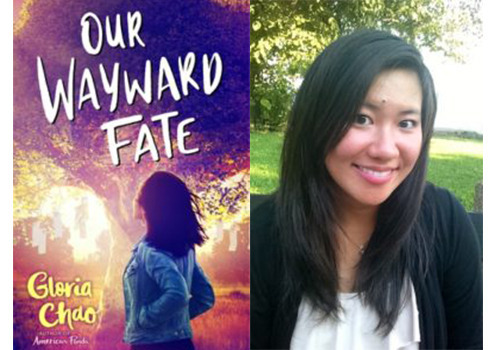
In 2016, May Cobb ran away with NaNoWriMo Pitchapalooza. She’s been capturing attention ever since. This time it was a “heated six-publisher auction” that ended with Berkley winning the rights to publish her latest thriller The Hunting Wives, which was pitched as In a Dark, Dark Wood meets Mean Girls. Berkley plans an early 2021 release. Read May’s winning pitch.
“Having my pitch selected as the 2016 winner for Pitchapalooza was such a boost! Of course it was wonderful to win, but even more than that, having the Book Doctor’s feedback on my pitch was instrumental.”
–May Cobb
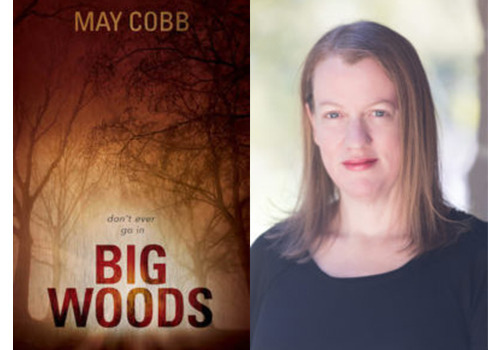
Stacy McAnulty has been on fire since she won our third NaNoWriMo Pitchapalooza. Her latest middle grade novel, The World Ends in April, is out now from Random House Books for Young Readers. Shelf Awareness gave it a starred review and called it “a smart, funny and emotionally candid book.” Stacy also signed a deal with Random House to publish another middle grade novel, A Penny Doubled, pitched as How to Steal a Dog meets Brewster’s Millions. Look for it in spring 2021. Read Stacy’s winning pitch.
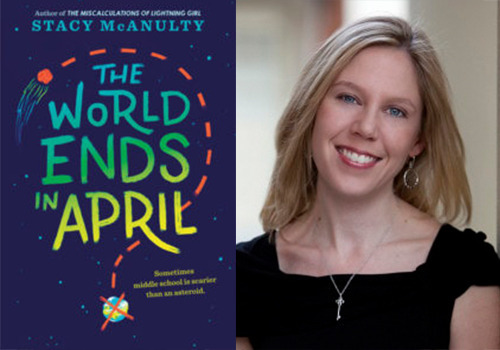
Cari Noga was one of our first NaNoWriMo Pitchapalooza winners. Her winning novel, Sparrow Migrations, went on to be a semi-finalist in the 2011 Amazon Breakthrough Novel Award contest, then she received an acquisition offer from Lake Union Publishing. Her latest novel, The Orphan Daughter (Lake Union Publishing), released last year. Read Cari’s winning pitch.
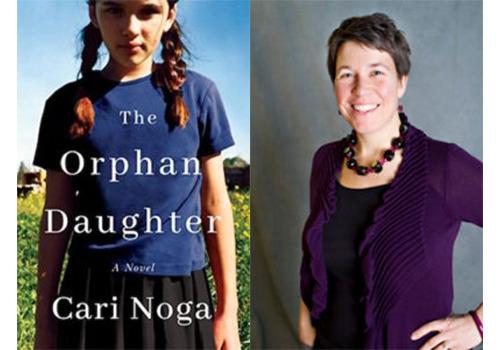
Are you feeling a little unsure about exactly how to craft your pitch? We’ve got you covered.
10 TIPS FOR PITCHING YOUR NOVELA great pitch is like a poem. Every word counts.Make us fall in love with your hero. Whether you’re writing a novel or memoir, you have to make us root for your flawed but lovable hero.Make us hate your villain. Show us someone unique and dastardly whom we can’t wait to hiss at.Just because your kids love to hear your story at bedtime doesn’t mean you’re automatically qualified to get a publishing deal. So make sure not to include this information in your pitch.If you have any particular expertise that relates to your novel, tell us. Establishing your credentials will help us trust you.Your pitch is your audition to show us what a brilliant writer you are, so it has to be the very best of your writing.Don’t make your pitch a book report. Make it sing and soar and amaze.A pitch is like a movie trailer. You start with an incredibly exciting/funny/sexy/romantic/etc. close-up with intense specificity, then you pull back to show the big picture and tell us the themes and broad strokes that build to a climax.Leave us with a cliffhanger. The ideal reaction to a pitch is, “Oh my God, what happens next?”Show us what’s unique, exciting, valuable, awesome, unexpected, about your project, and why it’s comfortable, familiar and proven.Arielle Eckstut and David Henry Sterry have appeared everywhere from NPR’s Morning Edition to The New York Times to The Wall Street Journal to USA Today. They have taught everywhere from Stanford University to the Miami Book Festival to the granddaddy of American bookstores, Strand Books in New York City.
Their book, The Essential Guide to Getting Your Book Published , is the go-to book on the subject, and contains all the information you’ll ever need, taking you through the entire process of conceiving, writing, selling, marketing and promoting your book.
January 30, 2020
5 Things to Look For in a Beta Reader

When you finally finish your NaNoWriMo novel, the options for taking the next step can be overwhelming. Today, writer Sarah Beaudette of The Spun Yarn gives you a few tips on finding beta readers that will help you take your novel to the next level:
When NaNoWriMo ends, you’ve probably finished both your draft and your self-congratulatory cake, bottle(s) of Scotch, really involved vegan lasagna, (or whatever you do to celebrate). Once you’ve taken time away from the manuscript to regain some precious objectivity, you are now entering The Editing Realm.
Here’s where it gets tricky if you actually want this baby to make it into the world. For one thing, you’ve got a lot of options: self-editing, developmental editor, self-publishing, traditional publishing… the list is nearly endless.
BEFORE you engage in this choose-your-own-adventure terror, it’s fairly standard to get a few beta readers. If your book is your baby—something you and the universe have created using your genetic material and life experience but which will ultimately live out in the world—who are the first people you trust to hold this fragile, precious, bloody thing?
The people who love you and who you love the most. Natch. Many writers send their newborn draft to their parents, partners, and best friends. This is all good. The writing experience is raw. You need to be acknowledged for the incredible work you’ve put in. You need to share the exultation, and to hear how beautiful it is, how perfect, how new.
After that? It could be a few years or a few months, because your book is not actually a child, but it if it were, you would need to send that kid to kindergarten. You would need to put that beautiful child into the hands of an experienced, loving, qualified stranger, who can help you guide it to its ultimate potential.
Here are a few things to look for when you’re casting your beta reading net:
1. You need compassionate strangers.You need to know what you’re really looking at here. The [kindergarten teacher/beta reader] loves [kids/books], and they can be honest about what your [kid/book] needs to succeed, in comparison to the hundreds of other [kid/books] they’ve seen.
2. You need people, plural, so you can view suggestions as objectively as possible.Your instinct is going to be to disagree with people, because you wrote it the way you wrote it for a reason: My kid is perfect! You’re open to feedback, but it should be persuasive. It’s hard to get more persuasive than two people who have never met one another, and who independently agree on the same thing. If two babysitters say that Jimmy likes to smear his boogers on the dog when you’re gone and neither babysitter has met the other… well. When it’s time to decide how to edit, you want that decision to be clear by virtue of consensus. When it comes to beta readers, one is not enough.
3. You need professionalism: people who stick to a deadline, and actually, you know, read the whole book.You think we jest. Ask your writer friends how many people (even within their inner circle), have read the whole book, in a reasonable amount of time, and have given a thoughtful, thorough, opinion. You can tell when someone skims. If they skimmed, how can you trust that feedback? And why did you go to the trouble in the first place? Were you trying to write the best book you could write, or did you just want to tick the beta reader box and go on telling yourself your kid is perfect?
4. It would be great if your beta readers have read a lot in your genre.Each genre has its own standards, conventions, tropes. If you wrote a western, you don’t want people focusing more on your prose than your action. The reverse is also true. If you wrote an upmarket women’s fiction manuscript, a thriller fan might think it’s moving more slowly than it should. Moreover, someone who reads a lot in your genre can tell you when you’re relying too heavily on genre tropes. They can also tell you when you’ve got something the genre hasn’t seen enough of, and really needs.
5. You need your beta readers to bring the reading experience to the table.If you wrote a YA, who but an actual teen can say if your dialogue is like, so awkward? If you set your story in Alaska, you better know an Alaskan. If you really think you nailed it, test it. Be courageous. Who is your book is for? Find those people. They want you to succeed and they’ll be excited to help you level up.
Like anything, finding beta readers takes some work. There are services out there that help standardize the experience, give you what you pay for in terms of demographics, deadlines, structure, depth, and actionability. Or you can do it on your own. That’s the great thing about writing today. You actually can choose your own adventure, and if you want to survive this gauntlet and come out with a wise, seasoned, brilliant book that will take over the world, you’re going to need some help along the way.
Sarah Beaudette is a writer and Chief Editor at The Spun Yarn, where they believe that writing is hard and getting honest feedback shouldn’t be. Learn more about feedback that empowers authors to make decisions at thespunyarn.com.
Top photo by Tamarcus Brown on Unsplash.
January 27, 2020
The Benefits of Finding a Writing Group

People tend to think that authors only write alone, but that definitely doesn’t have to be the case! Today, writer Sharon L. Clark discusses some of the ways that finding a writing group has helped her with her writing:
We’ve all heard how writing is a solitary pursuit. It can be a challenge to sit in a room full of people while trying to listen to the voices in your head so you can put it all down on paper.
I mean, everyone does that, right?
Writing with a group doesn’t have to be difficult. I’ve found that some of my best work has come out when I was surrounded by my circle of like-minded authors. Through my regional NaNoWriMo writing group, I was fortunate to be thrust into a room full of talented people who wanted nothing more than to reach their word count and drag me, kicking and screaming, along with them. Their blind faith in me was infectious and I found myself—after my first NaNo—recruiting others to meet weekly, planning dinners, and trying to be that voice of inspiration that keeps a struggling author from walking away.
There are astounding benefits to finding or building your personal writing clan.First and foremost is accountability. It may just be me, but when I’m home there are a million other things that I should probably get done before I sit down and indulge my writing habit. The dogs are always in need of a walk or a snack, the laundry is never ending, dinner won’t cook itself, or my DVR is full of unwatched episodes of my favorite shows. But when I go to an outside location to meet other people who are expecting me to write, it’s as though I can finally give myself permission to indulge my creativity.
Plus, the others will be able to see if I’m doing nothing but watching endless funny animal videos.
You can find information for basically anything on the internet, and that includes hints and tips on writing techniques. But how much more do we retain by being able to ask questions of a live person who has been there and done that? The writing community around you is a wealth of knowledge about whatever you need to know. Whether it’s plotting, fighting through writer’s block, or using new software, chances are better than good that someone in your writing community has experience they will be more than happy to share.
For me, personally, the most rewarding aspect of finding my writing group has been their support, encouragement, and friendship. The circle of authors I met through NaNoWriMo are wonderful sounding boards, cheerleaders, editors, and friends. I genuinely enjoy being around them and, even more importantly, I trust them. I trust them to be honest but not mean, to build me up without exaggerating, and to be there for me when I need a boost as I hope they know I’m there for them.
I strongly encourage you to look at the groups in your nearest region. Try a few on for size until you find the one that’s just right for you, and you will find that the rewards will be plentiful and well worth the effort.

Sharon L. Clark is an author, wife, and mother living in Des Moines, Iowa. She has written a collection of short stories and serials and one of her short ghost stories has been included in a Halloween collection, Chills Down Your Spine: A Scary Halloween Anthology. More samples of Sharon’s work can be found on the writers’ website Channillo and on her website SharonLClark.com, or you can follow her writing journey on Twitter or Facebook.
Top photo by Brooke Cagle on Unsplash.
January 24, 2020
Happy Friday, writers! Tag yourself: which author persona do you...

Happy Friday, writers!
Tag yourself: which author persona do you use most often?
[IMAGE DESCRIPTION: A meme showing four different writer “profile pictures”. On the top left is LINKEDIN: A man in a suit typing on a computer with a fancy messenger bag beside him, with the NaNoWriMo logo on the bag. On the top right is FACEBOOK: two women writing together at a table with computers, a ukulele, and mugs of coffee, with the NaNoWriMo logo on the wall. On the bottom left is INSTAGRAM: A notebook propped up against a couple of plants on a wooden desk, with the NaNoWriMo logo on the notebook. On the bottom left is TINDER: A woman with the NaNoWriMo logo over her face, flinging her hair back on a bed while books magically seem to fly around her.]
January 21, 2020
Writing Adventures in Foreign Languages

There can be many challenges to writing and editing… and even more when multiple languages are involved! If you’re a writer who dabbles in different languages, NaNoWriMo writer Claudia Schmidhuber has some tips:
For many of us NaNoWriMo starts with questions like these: Who are my characters? What is my plot? Where are my 500 gallons of coffee? For some of us NaNoWriMo starts with a question like this: Which language do I write this in?
If you didn’t grow up in an English-speaking country, or grew up speaking more than one language, you might have run into that exact problem. You might have wondered if you should give writing in the language you’re less comfortable with a shot. Particularly when your second language is English, you might have considered that writing in English instead of your native language will give you a larger audience later on. Or maybe you’re just in the mood to challenge yourself.
There’s a variety of issues that are likely to hold you back. You don’t want to spend half of your writing time looking up words you don’t know, you think your grammar isn’t up to par, and maybe you feel like your writing won’t be good enough if you write in a language you’re not as familiar with. Many of us have been there. And we decided to go for it anyway.
Here’s what you can do to make things easier for yourself (other than getting those 500 gallons of coffee): Find fellow writers who speak the language you’re writing in, be it in forums, on Twitter, on Discord, or in whatever other spaces are available to you. It’s not so much about having someone to correct your spelling and grammar – honestly, spell check will help you out quite a bit here – but more about having someone to ask, “Hey, do you actually say this?” You’ll learn vocabulary, idioms and phrases at school and later on you’ll find out that no one who speaks the language you learned actually says those things in real life.
If you struggle with vocabulary, don’t hesitate to put words in your native language in the middle of a sentence. Go ahead and write entire sentences in your native language. Make sure you can find them again later and look up those words once you’ve come to a point where checking a dictionary won’t interrupt your flow of writing. Don’t be scared of the Grammar Police. You’re learning a language and you’re allowed to make mistakes! You’re doing something really impressive and, no matter which language you’re writing in, your first draft doesn’t have to perfect.
At the end of your foreign language adventure, you’ll know tons of new words, you’ll have great new friends to practice that other language with, even when you’re not writing, and most of all, you’ll be extremely proud of yourself for writing a whole story in a non-native language.
Claudia Schmidhuber is a frequent NaNoWriMo participant from Germany. She started writing as a hobby while pursuing her BA in Literature and wrote her first novel in English. She hasn’t looked back since. You can follow her on Twitter @ahlettuce.
Top photo licensed under Creative Commons by Clair Pickworth on Flickr.
January 20, 2020
Brave the Page: Pep Talk from Scott Westerfeld

Brave the Page, our NaNoWriMo handbook for young writers, is available to order! Partly a how-to guide on the nitty-gritty of writing, partly a collection of inspiration to set (and meet) ambitious goals, this is our go-to resource for middle-grade writers. Check out this Brave the Page excerpt on revision from bestselling author Scott Westerfeld:
At the end of drafting a novel, I’m usually in need of a laugh, so I return to the very first pages I wrote. It’s like looking at photos of myself in middle school: How innocent I was back then! How badly dressed! But what I’ve gained since those early days isn’t so much wisdom (or a better haircut) but perspective. I can see now where things were headed.
Alas, when looking at old pictures, you can’t go back and give yourself advice. But with first drafts you can! In that moment before revising begins, you’re no longer stuck in the hurly-burly of “What happens next?” and “What’s this character’s motivation?” You have perspective.
So here’s a suggestion: the first day of a revision is the perfect time to outline your novel again. Perhaps we should call it re-outlining, or simply stepping back.
It’s tempting to start just rewriting Chapter One. But set that aside for a moment and make yourself a map, a big-picture view of how the pieces of your novel fit together.
You probably have your old outline. Put that aside, and look at what you wound up actually writing. A complete draft has its own logic. (If it doesn’t, maybe you’re still drafting.) Clear away those youthful hopes and dreams and look back at where you went wrong.
A lot of rewriting—like a lot of growing up—is simply admitting how clueless you were not so long ago. (Which is why some people never rewrite, and why some people never grow up.)
So start your revision by answering these questions: Which scenes work, and which are clunky? Which characters never took off, and which turned out to be unexpectedly compelling? Which goals that you started with aren’t worth pursuing anymore? And what startling new vistas opened up?
In other words, what do you know now that you didn’t know then?
Realize how little you knew when you started, appreciate how much smarter you’ve become, and accept what innocence you’ve lost. Then make decisions accordingly, even if that means throwing away the obsessions of your younger self.
To throw one more analogy at you, a novel is like a cloud. When you’re in the thick of it, its shape is unknowable. But once you’ve passed through and gained a little distance, it’s much easier to see.
Make sure you take a picture before you dive back in.
Scott Westerfeld is the #1 New York Times bestselling author of the Uglies series, which has been translated into 35 languages; the Leviathan series; Afterworlds; Horizon; and many other books for young readers. He was born in Texas and alternates summers between Sydney, Australia, and New York City.
January 17, 2020
3 Bad Writing Instincts and How to Transform Them into Good Instincts

As you begin revising your November novel, you’ll probably notice a lot more about your manuscript now that you’re looking at it with a critical eye—some good, some that needs reworking. Today, Municipal Liaison Rebekah Loper shares some good and bad writing instincts that may help you with your edits:
When you sit down with a blank page and a story idea, you’re bringing all the habits you’ve learned along the way, and those habits aren’t always good.
If you’re a new writer, you’re bringing along all that maybe-not-so-helpful advice everyone shared when you announced your book writing intentions. If those advice-givers haven’t actually written a book ever, ignore them.
Bad Instinct #1 – Explaining Too MuchAh, the dreaded info dump. We’ve all read one, but it’s hard to catch ourselves while writing one. And for NaNoWriMo, we’ve told ourselves that any words are good words, so long as they get written, and this is true. You can’t fix an unwritten story.
Info dumps usually don’t become noticeable until we’re re-reading a draft, and they’re so challenging to get rid of because as the creator of our stories, we love what we write (mostly).
Good Instinct Alternative – Knowing Your Story & Its WorldThe knowledge contained in an info dump isn’t bad—it just doesn’t necessarily belong where it ended up. And yes, sometimes that information doesn’t belong in the story at all but it’s almost always something you, as the author, needed to know.
Learn how to tease your readers, only giving away information as necessary. For those info dumps you just can’t part with, pull them out of your story and put them in your story bible in case you need to reference it later.
Bad Instinct #2 – Mimicking Another Writer’s VoiceAs you delve deeper into the world of writing and begin to study the processes of the craft, you’re going to stumble across advice telling you to find your own writing voice.
Finding the elusive, mythical creature known as ‘my writing voice’ was a daunting task when I first stumbled across this advice—especially since it was never well-defined. I remember being advised to read a lot, and learn to recognize other ‘writing voices’. While learning to recognize these can be a beneficial skill (especially if you ever want to be a ghostwriter), this never actually helped me write better stories.
It can also be tempting to try and sound like another author, particularly one you admire. But then, instead of telling your own unique stories, you start to tell someone else’s.
Good Instinct Alternative – Recognizing the Sound of Your Own Voice“So how do I find my writing voice?” It’s actually simple—you write.
Your voice is already there. It’s not something you find, it’s a skill that you hone.
‘Writing voice’ is the way you phrase sentences, the cadence you naturally fall into. Often, you’ll find your writing voice is easy for you to read aloud, because it sounds like you.
Reading your own work aloud is a great way to refine your voice, especially in later drafts of a book. Take note of the places where you instinctively want to use a different turn of phrase, or a word just doesn’t quite mesh with what you were trying to convey. Then re-write it how you want to say it.
Bad Instinct #3 – Being Overly Protective of Your StoryNo matter how experienced of a writer you are, the first time you send a new story out to critique partners, beta readers, or even an editor, you’ll be really nervous. For new writers especially, those nerves might start when you even think about sharing your work with someone else.
It can also happen when you find out someone else has written a story with a very similar premise to yours. Then you start wondering if, by the time your story is ready to be unleashed in the world, your words will even matter anymore. (They will. Even if premises are similar, no story told by two separate people could ever be the same.)
Those feelings might be so fierce you’re tempted to just shove your story in a drawer and forget it. But if you do that, you’ll never grow into your full potential.
Good Instinct Alternative – Recognizing the Value of Constructive CriticismIt’s okay to be selective about who sees your stories, especially in those very early drafts. Your critique partners (other writers, preferably) and beta readers should understand that the story is pretty raw at this point. No first draft (and rarely second or third drafts) is ever ready to be released wild into the world.
You will need to practice accepting feedback, especially from more experienced writers and readers who know your genre. You’ll need to learn how to recognize when a piece of feedback doesn’t actually apply to your story.
Trust your gut. Be selective in who you let read your work, and if a critique partner or beta reader just isn’t meshing well with your vision, don’t be afraid of ignoring their advice.
What bad instincts have you noticed in your own writing habits? Or, conversely, what good instincts came easily to you?

Rebekah Loper began creating fictional worlds and epic stories as a child and never stopped. Now she also helps inspire others to write their stories through her volunteer work as a NaNoWriMo Municipal Liaison, and with her workbook, The A-Zs of Worldbuilding: Building a Fictional World From Scratch. Her most recent release, a fantasy short story titled The Path of Mercy, is available in Beatitudes & Woes: A Speculative Fiction Anthology.
Rebekah lives in Tulsa, Oklahoma with her husband, a dog, two formerly feral cats, a flock of chickens, and an extensive tea collection. She is often found battling the elements in an effort to create a productive, permaculture urban homestead on a shoestring budget.
She blogs about writing and urban homesteading at rebekahloper.com, and has been a contributing writer for Fantasy-Faction.com. You can follow her on Facebook, Instagram, and Twitter.
Top photo by Free To Use Sounds on Unsplash.
January 15, 2020
Navigating Tropes and Clichés in Genre Fiction

As you begin revising your November novel, you’ll probably notice a lot more about your manuscript now that you’re looking at it with a critical eye—some good, some that needs reworking. Today, writer Nathan Dhami is here to help you distinguish between tropes and clichés, and how they may help or hinder your novel:
Genre fiction, while being a very broad and catch-all term, is gaining mass appeal with contemporary audiences and writers alike. Newer writers may try writing their favorite genre, but might be lost as to where they should start. Maybe they are inspired by their favorite pieces in the genre they wish to emulate, but have no idea how to apply that inspiration. They may also be worried that their story is falling into trappings that leads to similar pieces being considered “boring” or “played out.” In other words, writers may have difficulty navigating and using the genre’s tropes in their own stories.
In order to make writing these stories easier, we must understand the differences between tropes and clichés. The dictionary definition of “trope” is “figure of speech,” but that could also refer to idioms and, well, clichés. I’ve come to understand tropes as plot beats or patterns that are inherently recognizable from work to work due to how often they appear. (While you shouldn’t spend too much time on TVTropes, the website is a good informal catalogue of tropes in media.)
In superhero fiction, one of the most recognizable tropes is “the Cape,” a superhero who is pure of heart and fights for justice, representing the ideal “good” hero. If the first example of the Cape that popped into your head was Superman, that’s because the DC Comics hero is the pinnacle of the trope- he even wears an iconic bright red cape!
“Tropes as plot beats or patterns that are inherently recognizable from work to work due to how often they appear.”A cliché is a type of trope—one that has become common enough that its occurrence is expected in a work or set of works. Depending on the execution, a motif could be a well-used trope or a trite cliché. One such example that gets brought up a lot in writing workshops is the phrase “love is like a rose.” It’s easily recognizable, because we already associate roses as a gift or a symbol of love. However, this simile is played out and not very innovative. Your audience probably already expects roses to appear when you’re writing a romantic poem or story, and while I’m not saying that you can’t include roses at all, it is often best to explore the emotion of love with other images and phrases.
So why use tropes if they can be misused or if you’re worried about your audience recognizing them? The simple answer is tropes are tools that you employ in your writing to convey your plot beats in an efficient and compelling way. Tools are meant to be used. Just like I would have a difficult time constructing my work desk without the right hammer, drill, and screwdriver, you will have a difficult time constructing your story without using the right tropes.
Your audience should recognize the tropes that you use when telling your story, especially when it comes to writing genre fiction. Genre fiction relies heavily on tropes because it’s written to appeal to a specific audience. Because your reader should already be familiar with the genre you’re working in, this means you can invoke and play with particular tropes in order to satisfy or defy your audience’s expectations, without having to construct or define specific plot beats for the first time ever in your story. You can’t worry about cynical fans pointing out everything you write that reminds them of [thing] from [another story]. Just use the tools that other writers and stories have provided to your advantage and construct your world the way you want to.

Nathan Dhami is a UC Irvine graduate with a BA in English. His creative work, often related to superheroes and video games, has been featured in Orange County writing journals such as New Forum and The Ear. He has participated in NaNoWriMo every year since 2014. Samples of Nathan’s work can be found at https://www.clippings.me/litetheironman.
January 13, 2020
nanowrimo:
I Wrote a Novel… Now What? Your Revision and Editing...
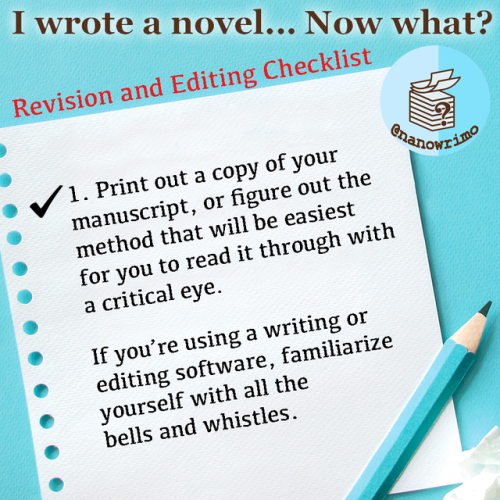

Inspiration for this step taken from Tomehbell's blog post: http://blog.nanowrimo.org/post/154469...

Inspiration for this step taken from Elizabeth Kracht's blog post: http://blog.nanowrimo.org/post/155628...

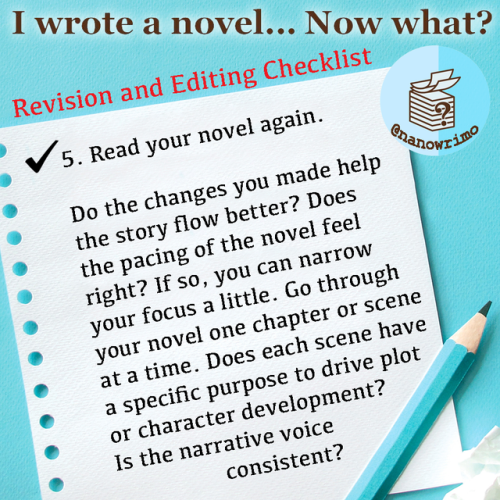

Inspiration for this step taken from Derek Murphy's blog post: http://blog.nanowrimo.org/post/156279...
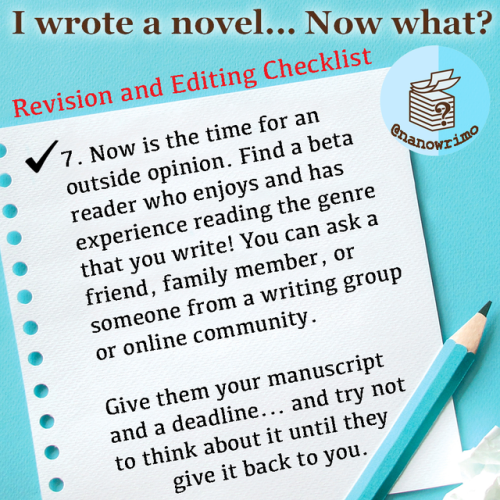
For more about finding beta readers, check out Jody T. Morse's post: http://blog.nanowrimo.org/post/155487...
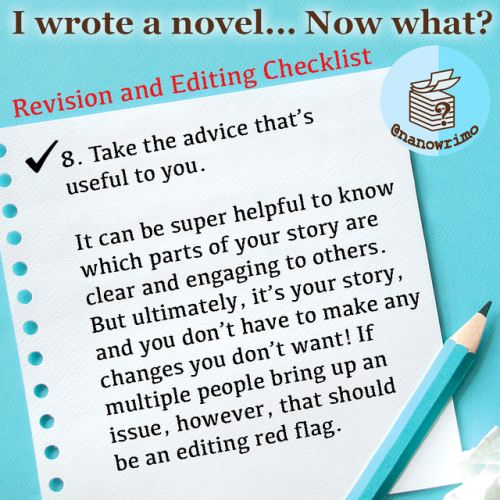
I Wrote a Novel… Now What? Your Revision and Editing ChecklistIf you’ve completed a first draft of your novel, congratulations! However, after the hustle of getting that draft written, you may be wondering… what do you do with it now? This January and February, NaNoWriMo’s “Now What?” Months are here to help guide your novel through the revision, editing, and publishing process.
To start you off, we’ve taken some inspiration from previous blog posts to create this handy-dandy Revision and Editing Checklist. Don’t know where to start? Use this guide to help you navigate the tricky waters of novel revision!
Image background by rawpixel on Unsplash.
January 10, 2020
3 Things Authors Should Know About Publishing

Every year, we’re lucky to have great sponsors for our nonprofit events. IngramSpark, a NaNoWriMo 2019/2020 sponsor, is here to help you with some publishing tips (Plus, check out their writing challenge for the chance to win some cool prizes!):
Taking the leap from writer to published author is a huge accomplishment—and often the end goal for writers who complete NaNoWriMo. We all write for different reasons. We’re motivated by different life experiences, and we pursue a wide variety of genres and plot lines, but once the writing is finished, we generally all want the same thing: to share our work with others. So if you’re considering publication for your writing, here are a few things to keep in mind.
Gone are the days when traditional publishing was the only way that “real” authors could publish their work. With advancements in technology, independent publishing has become an increasingly viable option. With the right printing and distribution, your book can look the same as any produced by traditional publishers—with the same availability. Not to mention, you can skip the gatekeepers, maintain creative control, and receive higher earnings per book sale.
Keep in mind that independent publishing will require you to seek help from a professional editor, book designer, and be willing to dive into your own book marketing, but all of these are easily accessible to indie authors and well worth the return on investment when you publish professionally.
2. Never limit your book’s potential reach.If a reader wants to read your book, your book should be available to them—it’s as simple as that. You don’t know how readers will want to consume your content, so be sure it’s offered in print and ebook formats. Why exclude those who ONLY read print books or ONLY read ebooks?
Your reader may shop exclusively at their local independent bookstore, they may only shop for books online, or they might even leave their book discovery to libraries. Make sure your distribution doesn’t exclude any of these outlets. You never know who will want to buy your book; it may even end up being highly popular to those in a country other than your own. Make sure when you publish your book, your potential reach isn’t limited, globally or by distribution channel, so as not to exclude any potential readers from buying your book.
3. Being prepared is key.The most successful authors and publishers are the ones who understand the publishing process, the publishing industry, and their audience. If any of these pieces are missing, your book can’t reach its full potential. If you’ve created a work that matters to you and you genuinely want to share it, you owe it to yourself and your book not to slack in these essential areas. Do your research to understand:
what kind of editing or design your book may need.the appropriate timeline for production and promotion.what booksellers and libraries need from you and your book in order to carry it.what kind of media coverage you can get.what month is best to publish a book like yours.what books similar to yours look like.how much they sell for.what keywords you may want to sprinkle into your book description to attract your target readers.All of these pieces are important to producing the best book you can, and all the information is available to you.
The only thing that stands between you and the publication of your book is a way to publish professionally, a way to ensure your book is shared widely, and the willingness to learn how to make your book a success (ideally, all within a reasonable price range to make sure your efforts pay off).
These things seem like a much lower barrier to entry than what is offered by the traditional publishing process, considering how much time and effort you dedicate to convincing others your book is worthy before ever seeing a dime. Independent publishing isn’t for everyone, but neither is traditional publishing, so it’s always good to be aware of your options and fully explore what’s right for you and your book.
About IngramSparkIngramSpark® is an award-winning independent publishing platform, offering indie authors and publishers the ability to create professional print books and ebooks. Self-publish a book and make it available to 40,000+ retailers and libraries—in stores and online—through IngramSpark’s global distribution network. Share your story with the world at www.ingramspark.com.
If you’d like to learn more about how IngramSpark supports you produce quality publications, achieve global distribution, and access free resources to help you publish successfully, please visit our website.
All WriMos receive FREE title setup on print or ebooks (and free revisions) with IngramSpark until March 31, 2020, with promo code NANO2020. Write with NaNoWriMo, publish with IngramSpark.
Regardless of how you decide to pursue your publication goals, may your writing accomplishments be validated and your words well-read!
Chris Baty's Blog
- Chris Baty's profile
- 63 followers



